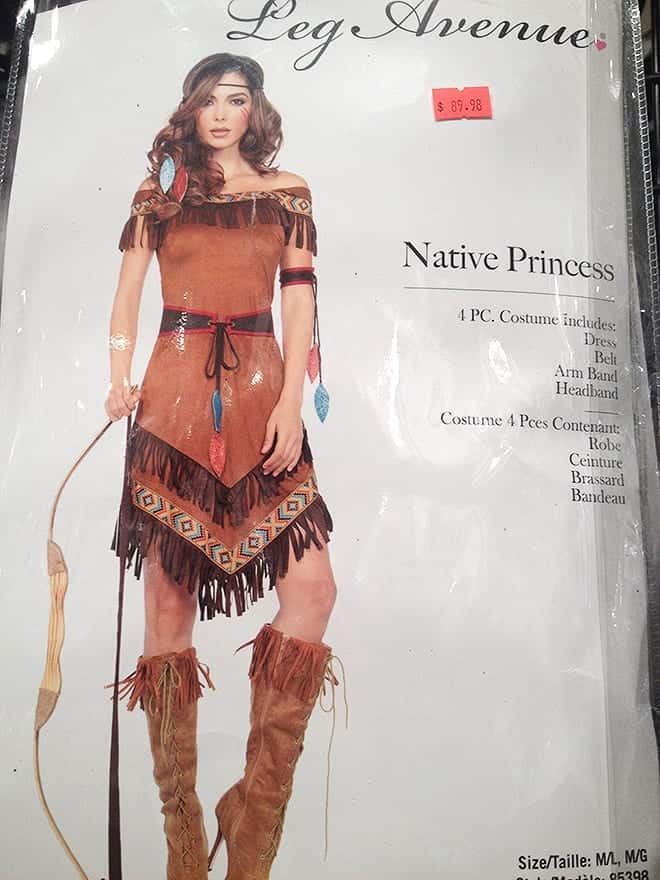First Nations themed Halloween costumes offensive to everyone

Ignorant racism dressed up as innocent fun
Jennifer Marshall — Contributor
Genocide. Apartheid. Slavery. Sound familiar?
To the average person, these events evoke memories of tragedies occurring in places like Germany, South Africa and the United Sates. But news flash folks – the ugly and often ignored truth is that it also happened right here on the very land we call home.
In 1493, Pope Alexander VI issued the Doctrine of Discovery, a document that legalized the seizure of First Nations peoples land by any means necessary. This document was a catalyst for unspeakable acts committed against the original inhabitants of North America (once known as “The People’s Island”). The effects of the doctrine, and the colonization it facilitated, are still rippling through generations of First Nations peoples who are mistreated and misunderstood to this day.
With this history in mind, it is difficult to imagine how Halloween stores are now selling costumes labeled “Huron Honey,” “Indian Princess,” “Queen of the Tribe,” and “Reservation Royalty.” The costumes are not only labeled with controversial terms that either inaccurately describe First Nations culture or blatantly disrespect it, but are designed to look sexy as well, which contributes to the overall inappropriate nature of them and works to perpetuate negative and culturally damaging stereotypes of First Nations peoples.
With many First Nations reservations currently having to boil their water before drinking it, struggling with overcrowded living situations, and many other disadvantages, the particular label “Reservation Royalty” is worryingly ignorant.
It doesn’t take a genius to look at these costumes and come to the conclusion that they are offensive; if not directly to you, then to someone you know or know of. The question is, why are we still living in a country where this type of ignorance can be marketed, sold and profited from?
Recently, an article surfaced on the CBC voicing a Regina teacher’s disappointment that costumes like these are being sold. Students at the First Nations University had similar opinions.
Kecia Cook agrees that it is a very controversial issue, and recognizes that while women may enjoy dressing up as Pocahontas, a character from a Disney movie, these costumes in particular are going too far.
Kecia told the Carillon, “I think they are degrading, ignorant, cheap and misleading.”
First Nations student Kaylen Saulteaux sheds some light on how the costumes are disrespectful of her culture’s values and beliefs.
“Our outfits all symbolize something within our culture and should not be used to play dress up. Not everyone can wear a headdress and be a chief; it takes knowledge and leadership to gain the right to wearing a headdress. The people who think it is okay to use our culture as a costume need to educate themselves, and see how ignorant this really is.”
Saulteaux highlights the undeniable gap in understanding and respect between Canadians and First Nations communities and their culture. The problem seems to be, as usual, a lack of education rather than malice and ill intent. But does that make it ok?
It is hard to believe that people would create costumes like this if they knew the real history of indigenous peoples in Canada. A recent CBC online poll asked readers their opinion regarding the controversy, and the results are curious. The three opinions to choose from and their results were as follows (as of Oct. 25, 2015):
These costumes are racist (57.92 per cent); people should lighten up (32.82 per cent); not offended, but can understand how others might be (9.26 per cent).
A significant number of readers believe that people have overreacted to the sale of these costumes, perhaps not recognizing the negative and insensitive implications of them. As a University that is working to build a strong relationship with the First Nations community through partnership with the First Nations University of Canada, it is difficult to see the community around us participating in the continued destruction of relationship building and reconciliation.
Is the appearance of these costumes an unfortunate step backwards, or a much-needed wake up call for Canadians to recognize the need for a drastic change in an attitude that has persisted in our culture since the age of “discovery?”









